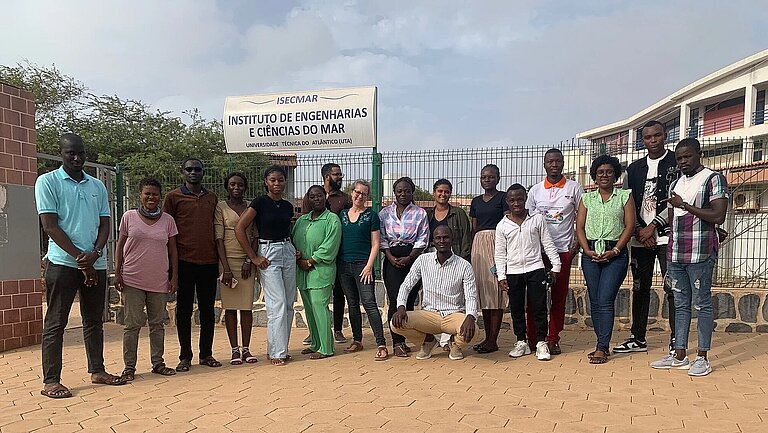Communicating global environmental justice at eye level
Kiel’s human geographer Silja Klepp taught in Cabo Verde as part of the WASCAL programme for West African master's students
Teaching modules with local and international experts are an essential part of the curriculum of the WASCAL Master's degree program. They teach the 13 students in the current cohort various teaching and research topics, including the three-day course on environmental justice.
Professor Klepp began by providing insights into the social dimensions of environmental conflicts, a better understanding of human-environment relationships and social science research methods. Another focus was on interdisciplinary communication and cooperation. "The pluralistic approach to environmental justice incorporates different perspectives. This is crucial for analyzing relationships and conflicts between people and their environment, especially with regard to possible postcolonial structures", says Klepp, who conducts research at the Institute of Geography at Kiel University, primarily on climate and environmental justice and the use of coastal areas from a social perspective. "Teaching in Cabo Verde is therefore very valuable for me. It is also an attempt to decolonize education and a joint search for formats for cooperation at eye level with the students", says the human geographer.
On the following two days, the students conducted their own research on the topic of environmental justice. Among other things, they looked at the desalination of seawater in Cabo Verde and its impact on the environment, the protection of marine and coastal habitats of sea turtles on Sao Vicente, the economic use and destruction of mangroves in Benin and Guinea and oil pollution in the Gulf of Guinea. At the end, they presented their results, which were also followed by WASCAL program director Professor Dr Corrinne Almeida. "The students only started at the end of 2023 and I am already impressed by the self-confidence and commitment with which the cohort internalizes the diverse content", says the biological oceanographer from the Cape Verdean partner university UTA.
Master's program in full swing
Professor Klepp, Professor Körtzinger and Professor Almeida also see great potential for collaboration in the marine WASCAL Master's program in the future. Already the 4th cohort runs through the program, which was launched in 2019. Bachelor's graduates from a total of twelve West African countries can apply for a scholarship in their respective countries and, after successful selection and a joint language course lasting several months, live in Mindelo for almost two years.
In addition to the lectures and practical courses, the program also includes a scientific stay for their master's theses as well as the fortnight, sea-going training component "Floating University", which is coordinated at GEOMAR. For almost 20 years, GEOMAR has maintained a long-standing, close and cooperative partnership with Cabo Verde and has been running the Ocean Science Center Mindelo (OSCM) together with the Instituto do Mar (IMar) since 2017. The close cooperation with the West African island state is also being strengthened in the joint marine promotion of young scientist program "Foster Young Ocean Researcher Development" (FYORD) between Kiel University and GEOMAR.
Background information on the WASCAL Master’s programme “Climate Change and Marine Sciences”:
The West African Science Service Centre on Climate Change and Adapted Land Use (WASCAL) funded by the German Federal Ministry of Education and Research (BMBF) is a large-scale research-focused Climate Service Centre designed to help tackle this challenge and thereby enhance the resilience of human and environmental systems to climate change and increased variability. It does so by strengthening the research infrastructure and capacity in West Africa related to climate change and by pooling the expertise of twelve West African countries and Germany.
The WASCAL Graduate Studies Programme for university graduates supports and facilitates academic education amongst West African universities on climate change and how to deal with the effects on land and sea use in Africa in cooperation with German partner institutions. The activities focus on the training of doctoral and Master students. The two-year WASCAL Master's program "Climate Change and Marine Sciences", which started in 2019, is coordinated by Professor Corrine Almeida at the partner university Universidade Técnica do Altantico (UTA) in Mindelo, Cabo Verde. The GEOMAR Helmholtz Centre for Ocean Research Kiel has closely supported the development of the program and involves the students in current research projects in the region. Lecturers of Kiel University with its research priority area Kiel Marine Science (KMS) are involved in teaching on site.
In the WASCAL Master's programmme “Climate Change and Marine Sciences” students from West Africa learn scientific and academic skills in the fields of climate, marine sciences and management from the international to the regional level. In this way, they prepare for subsequent postgraduate studies or careers for example in environmental management or industry, consultancies or government agencies. In 2021, the WASCAL Master’s programme on Cabo Verde was selected as an action of the United Nations (UN) Decade of Ocean Research for Sustainable Development. In 2022, 14 Master’s students participated in the first “Floating University” on board the research vessel MARIA S. MERIAN. In 2023, the “Floating University” took place during the expedition PS135-2 on research vessel POLARSTERN, which is operated by the Alfred Wegener Institute, Helmholtz Centre for Polar and Marine Research (AWI). The next “Floating University” is scheduled for March 2025 with subsequent opportunities to supervise Master’s students and their thesis.

Kiel geographer Silja Klepp (m.) was recently a lecturer in the WASCAL Master's program "Climate Change and Marine Sciences" at the Universidade Técnica do Altantico (UTA) in Mindelo, Cabo Verde. The 13 students in the current cohort learned more about the topic of environmental justice. Photo: Márcio Medena, WASCAL-Cabo Verde


